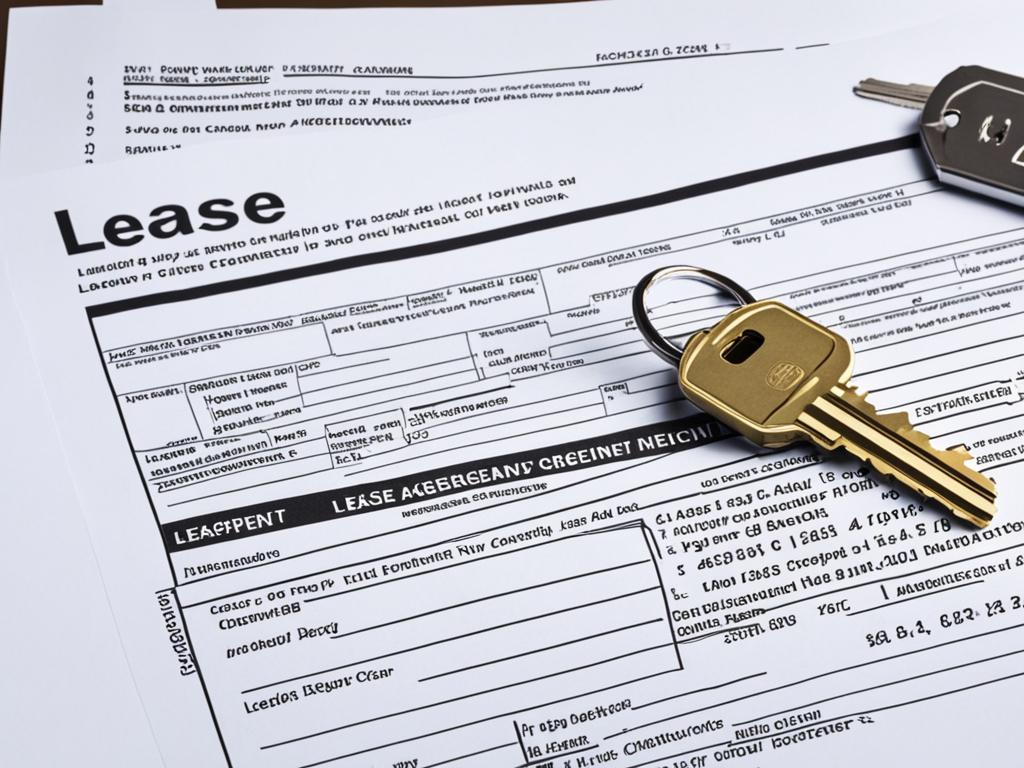End of Lease Letter to Tenant from Landlord Guide
When it comes to the end of a lease, both landlords and tenants need to understand their rights and responsibilities. Whether the tenancy is based on a lease or is an at-will tenancy, different rules apply. In a lease, the tenant agrees to a set term and can only end the tenancy before the lease term if the landlord agrees. In a tenancy-at-will, either party can end the tenancy by giving proper notice. It is important for both landlords and tenants to negotiate and communicate to ensure a smooth transition.
Key Takeaways:
- Understanding the rights and responsibilities of both landlords and tenants is crucial when it comes to the end of a lease.
- In a lease, the tenant can only end the tenancy before the lease term if the landlord agrees.
- In a tenancy-at-will, either party can end the tenancy by giving proper notice.
- Negotiation and communication are essential for a smooth transition.
- Both landlords and tenants should be aware of their obligations and fulfill them accordingly.
Understanding Tenancy Based on a Lease
When you sign a lease agreement, you are entering into a legally binding contract with your landlord. This lease agreement specifies the terms and conditions that will govern your tenancy for a fixed term, usually one year. Understanding the details of a lease agreement is essential for both tenants and landlords to ensure a smooth and mutually beneficial rental experience.
One of the key aspects of a lease is the fixed monthly rent. Unlike a tenancy-at-will where the rent can fluctuate, a lease agreement guarantees that the monthly rent amount will remain unchanged throughout the lease term. This predictable monthly payment allows for better budgeting and financial planning on both sides.
Another important aspect of a lease is that it provides stability for both parties involved. As a tenant, you can enjoy the peace of mind knowing that your landlord cannot terminate your tenancy without a valid reason and proper notice. The lease protects your rights as long as you comply with the terms and conditions outlined in the agreement.
However, it’s important to note that early termination of a lease can be more challenging. As a tenant, you are legally obligated to pay the monthly rent for the entire lease term. If you need to end the tenancy before the lease term expires, you will need to negotiate with your landlord and obtain their agreement to terminate the lease early. Keep in mind that your landlord may require you to cover any financial losses they incur as a result of the early termination.
A lease agreement should cover important aspects such as the duration of the lease, the responsibilities of both the tenant and the landlord, rules regarding maintenance and repairs, and any additional provisions specific to the rental property. By clearly outlining these details, the lease agreement ensures transparency and helps prevent misunderstandings or disputes between tenants and landlords.
In summary, understanding tenancy based on a lease is crucial for both landlords and tenants. For tenants, a lease provides stability and protection of their rights as long as they comply with the lease terms. The fixed monthly rent and the specific duration of the lease offer predictability and financial security. However, early termination of a lease requires negotiation and agreement with the landlord. By honoring the lease agreement, both tenants and landlords can maintain a positive and respectful rental relationship.
Exploring Tenancy-at-Will
In a tenancy-at-will, there is no set term for the tenancy, and it does not end on a specific date. The tenant pays the agreed-upon monthly rent for an indefinite period of time. Either the landlord or the tenant can end the tenancy by giving proper notice, which is typically 30 days or one month before the due date of the next rent payment. This type of tenancy allows for more flexibility but requires clear communication between the landlord and tenant.
To better understand the dynamics of a tenancy-at-will, let’s take a closer look at some key points:
1. No Fixed Term: Unlike a lease agreement with a set duration, a tenancy-at-will provides more flexibility as there is no specified end date for the tenancy.
2. Monthly Rent: The tenant is required to pay the agreed-upon monthly rent for as long as they continue to occupy the property. This allows the tenant to renew the tenancy on a month-to-month basis.
3. Notice to Vacate: Both the landlord and the tenant have the right to terminate the tenancy by giving notice. Typically, a notice period of 30 days or one month is required, ensuring that both parties have sufficient time to plan for the transition.
4. Clear Communication: Successful tenancy-at-will arrangements rely on open and transparent communication between the landlord and tenant. It is essential for both parties to discuss and agree on the terms of the tenancy, including rent, responsibilities, and notice requirements.
Proper communication and understanding of the terms and conditions are crucial to maintaining a harmonious tenancy-at-will. By establishing clear expectations and adhering to notice periods, both landlords and tenants can ensure a smooth transition when it comes to ending the tenancy.
| Tenancy-at-Will | Advantages | Considerations |
|---|---|---|
| Flexibility | – Allows tenants to stay on a month-to-month basis – Provides landlords with flexibility in reevaluating the rental terms |
– Potential for rent increases – Requires ongoing notice to vacate |
| Easy Lease Termination | – Gives both parties the freedom to end the tenancy without penalty – Allows landlords to make changes to the property or rental terms |
– Requires proper notice to vacate – Increased turnover rate can lead to higher vacancy periods |
| Less Commitment | – Ideal for tenants who may need temporary housing – Offers landlords the ability to adapt quickly to changing rental market conditions |
– Can lead to uncertainty for long-term tenants – May require more frequent tenant screenings |
It is important for both landlords and tenants to weigh the advantages and considerations of a tenancy-at-will before entering into such an agreement. Open communication and adherence to notice requirements can help ensure a successful and mutually beneficial tenancy.

Landlord and Tenant Obligations
Regardless of the tenancy type, both the landlord and the tenant have certain obligations. Understanding these obligations is essential for maintaining a harmonious landlord-tenant relationship. Let’s take a closer look at the key responsibilities of each party:
Landlord Obligations:
- Provide a safe and habitable apartment: Landlords are responsible for maintaining the property in a safe and livable condition. This includes ensuring that the structure is sound, the plumbing and electrical systems are in working order, and the property complies with the Sanitary Code.
- Comply with lease terms: Landlords must adhere to the terms outlined in the lease agreement, such as rent amount, due dates, and any additional obligations agreed upon.
- Fulfill promises made in the lease: If the lease includes any additional provisions or promises, such as providing certain appliances or completing repairs, landlords must fulfill these obligations as stated.
- Respect tenant privacy: Landlords must respect the tenant’s right to privacy and can only enter the rented premises under specific circumstances, such as for maintenance or inspections, and with proper notice.
Tenant Obligations:
- Pay rent on time: Tenants must pay the agreed-upon rent amount in full and on time, as specified in the lease agreement. Failure to do so may result in late fees or other penalties.
- Follow lease terms: Tenants are responsible for adhering to the terms and conditions stated in the lease agreement, such as pet policies, noise restrictions, and guest limitations.
- Maintain the rental unit: Tenants are expected to keep the rental unit clean and in good condition, reporting any necessary repairs or maintenance issues to the landlord in a timely manner.
- Take responsibility for damage: While normal wear and tear is expected, tenants are responsible for any excessive damage beyond what is considered reasonable.
By understanding and fulfilling these obligations, both landlords and tenants can contribute to a positive and cooperative rental experience. It is important to clearly communicate expectations and address any concerns promptly to maintain a healthy landlord-tenant relationship.
| Landlord Obligations | Tenant Obligations |
|---|---|
| Provide a safe and habitable apartment | Pay rent on time |
| Comply with lease terms | Follow lease terms |
| Fulfill promises made in the lease | Maintain the rental unit |
| Respect tenant privacy | Take responsibility for damage |
Remember, both landlords and tenants have rights and responsibilities that must be upheld to ensure a smooth and mutually beneficial rental agreement. Failure to fulfill these obligations may result in financial, legal, or interpersonal complications. It is always wise to consult the lease agreement and, when necessary, seek legal advice to resolve any disputes that may arise.
Negotiating Terms of the Lease
While not required by law, it is beneficial for landlords and tenants to negotiate the terms of the lease. By engaging in lease negotiation, both parties can reach mutually agreeable terms and conditions, ensuring a more satisfactory rental experience. It is important for landlords to approach the negotiation process with patience and understanding, allowing tenants ample time to review and consider the proposed lease terms before making a decision. Likewise, tenants should take the opportunity to clarify any doubts or concerns they may have regarding the lease. Clear communication and transparency are key to a successful negotiation process.
During lease negotiations, it is essential for both landlords and tenants to thoroughly understand the terms and conditions being discussed. This includes aspects such as the duration of the lease, rent amount and payment schedule, security deposit requirements, and any additional fees or charges. It is advisable to document any changes made to the lease during the negotiation process to avoid misunderstandings or disputes in the future. Furthermore, both parties should carefully review and agree upon the final terms before signing the lease agreement.
While certain terms are mandatory in a lease, such as the tenant’s responsibility for the payment of rent, there are also terms that are prohibited by law. Landlords should ensure that they provide all necessary information required by law and refrain from including any illegal or unfair terms in the lease. Prohibited terms may vary by state, so it is crucial for landlords to familiarize themselves with the applicable legal requirements to maintain compliance.
To help guide your lease negotiation process, consider the following strategies:
- Prepare in advance: Do your research and gather information about local rental market trends, including average rental rates and common lease terms, to inform your negotiation strategy.
- Be clear about your expectations: Clearly communicate your expectations regarding lease terms, including any specific preferences or requirements you may have. This will help facilitate a productive negotiation process.
- Consider compromises: In the spirit of negotiation, be open to considering compromises that may be beneficial to both parties. This can help build a collaborative and positive relationship between the landlord and tenant.
- Seek professional advice: If you find yourself facing complex lease negotiation issues or legal concerns, it is recommended to seek advice from a qualified attorney or real estate professional.
By engaging in lease negotiation, landlords and tenants can ensure that the terms and conditions of the lease are fair, transparent, and suitable for both parties. The negotiation process allows for open communication, the clarification of expectations, and the opportunity to address any concerns or questions. Establishing a clear and mutually agreeable lease agreement sets a solid foundation for a positive landlord-tenant relationship.
Pros and Cons of Lease Negotiation
| Pros | Cons |
|---|---|
| Allows for customization of the lease terms to meet specific needs | May prolong the leasing process |
| Promotes better understanding and clarity of the lease agreement | Potential for disagreement or inability to reach a consensus |
| Enables both parties to voice concerns and establish open communication | Possible need for compromise |

Ending the Lease – Termination and Security Deposits
When the lease comes to an end, there are important considerations both landlords and tenants need to be aware of regarding termination and security deposits. Understanding these aspects is crucial to ensure a smooth transition and avoid any potential disputes.
Returning the Security Deposit:
According to the law, the landlord must return the security deposit within 30 days after the termination of the lease. However, the landlord can deduct any unpaid rent or costs for repairing damages caused by the tenant during the tenancy. It is important for tenants to leave the rental property in good condition to ensure the full return of their security deposit.
Inclusion of Required Information:
The lease or rental agreement must include the necessary information about the owner and the contact for maintenance purposes. This ensures that both parties have the correct contact details and can easily reach out in case of any issues or concerns.
The State Sanitary Code:
The State Sanitary Code sets specific standards for a habitable living space, covering aspects such as ventilation, heating, plumbing, pest control, and more. Tenants have the right to request an inspection if they believe there are violations of the State Sanitary Code in the rental property.
Lead Poisoning Prevention Laws:
If the rental property was built before 1978, landlords must comply with lead poisoning prevention laws. These laws aim to protect tenants, especially children, from the dangers of lead exposure. Landlords should take the necessary measures to ensure the safety of their tenants by following lead-safe practices.
In summary, both landlords and tenants must be familiar with the rules and regulations surrounding termination and security deposits. By adhering to these guidelines, landlords can ensure a smooth process of returning the security deposit, while tenants can protect their rights and have a safe and habitable living space.

Conclusion
In conclusion, the termination of a tenancy can be a complex process that requires careful consideration of legal rights and obligations. It is crucial for both landlords and tenants to understand the proper procedures for ending a lease and to communicate effectively throughout the process.
By providing proper notice and engaging in open dialogue, many issues can be resolved without the need for legal action. However, in case of a dispute, it is advisable to seek legal advice to ensure that all rights and responsibilities are upheld.
In order to have a smooth transition at the end of a lease, it is important to be well-informed about the eviction process, termination of tenancy, and legal rights. Understanding the laws and regulations that govern these matters can help both landlords and tenants navigate the process with confidence.
Remember, ending a lease is a significant step that should not be taken lightly. By following the correct procedures and seeking the necessary guidance, both landlords and tenants can protect their interests and move forward in a fair and equitable manner.
FAQ
What is an end of lease letter to a tenant from a landlord?
An end of lease letter to a tenant from a landlord is a written notice stating the landlord’s intention to terminate the lease agreement and asking the tenant to vacate the rental property within a specific period of time.
What is a tenant notice to vacate?
A tenant notice to vacate is a written notice from a tenant to the landlord, notifying them of the tenant’s intention to end the tenancy and move out of the rental property. It usually includes information such as the desired move-out date and the reason for ending the tenancy.
What is a lease termination letter?
A lease termination letter is a written notice from either the landlord or the tenant, informing the other party of their intention to terminate the lease agreement before the agreed term. It outlines the termination date and any necessary details regarding the tenancy.
How can I end a lease agreement?
Ending a lease agreement depends on the type of tenancy. In a lease with a fixed term, the tenant can only end the lease early with the landlord’s agreement. In a tenancy-at-will, either party can end the lease by providing the required notice.
What are the obligations of the landlord and the tenant?
The landlord’s obligations include providing a safe and clean living space, complying with the Sanitary Code, and fulfilling promises made in the lease. The tenant’s obligations include paying rent, following the lease terms, and taking care of the property.
Should landlords and tenants negotiate the terms of the lease?
Yes, it is beneficial for landlords and tenants to negotiate the terms of the lease to ensure that both parties are satisfied. This can include discussing rent, maintenance responsibilities, and any other conditions that will apply to the tenancy.
What happens to the security deposit at the end of a lease?
At the end of a lease, the landlord must return the security deposit to the tenant within a certain time frame, usually 30 days. The landlord can deduct any unpaid rent or costs for damage beyond normal wear and tear before returning the remaining deposit.
What are the rules regarding termination and security deposits?
The rules regarding termination and security deposits can vary by state. It is important for both landlords and tenants to familiarize themselves with the laws specific to their location to ensure compliance and resolve any disputes that may arise.

